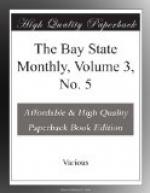Perry wrote to Governor Brooks of Massachusetts a letter condoling with him on the fall of his gallant son in action; for while Perry’s brow was laurelled with the wreath of victory, he did not forget that there were mourners weeping for brave hearts which in the fight had been forever put to rest.
The name of Perry was now made a household word from the great Northern Lakes to the Gulf of Mexico, from the Atlantic Coast to the impenetrated wilderness of the West, often repeated at the baptismal font; and a nation’s gratitude was soon laid at his feet. As humane in victory as he had been brave in action, his generous kindness won the admiration of Barclay, and his dying comrades showered upon him their blessings and remembered him in their final prayers.
Prayers of gratitude to that Almighty Power which had given victory to the American arms went up from every fireside throughout the Northwest; and mothers pressed their children more closely to their breasts as they thought themselves to be henceforth secure from the scalping-knife of Indian barbarity, and that the savage war-whoop would no more break the sleep of the cradle.
At night-fall many of the dead with all due solemnity were tenderly committed to the deep. The wounded had all been visited and their wants attended to; the worn and weary now sought repose, and a solemn oppressive silence soon pervaded the fleet, save here and there a sound of distress from the wounded. The Captain now retired for reflection, for his mind and heart were too full for rest. He then thought of his young devoted wife whose prayers he believed had been his shield in battle; that his work was yet incomplete while the British had an army on the borders of the Lake, or in Upper Canada,—how he could best aid General Harrison’s army; and then resolved on the work of the morrow; when, soothed by reflection, his tired nature gave out, and he, too, sank into a fitful slumber.
The mind of Barclay, relieved of present responsibility, evolved other less pressing but more pensive thoughts. He thought not of himself or his bleeding wound, for he had bled before for his country, when he earned his stars and made his fame secure at Trafalgar; but as the sun went down that night he thought that no more in the evening twilight would the mariners of England standing under the cross of St. George, on that great inland water, sing their national song, “Brittania rules the waves;” no more the echoes of that stirring air rolling over the silver surface of the Lake to its islands and shores would arouse the sturdy dwellers there to join in glad unison in those lofty strains which everywhere, the world over, melt into one every true and loyal British heart. He then was moved by the sadder thought, that on that night the sun of British power which had hitherto dominated the great Northern Lakes of America had gone down forever.
Perry’s available vessels were now taken to transport General Harrison’s army across the Lake, and up the Detroit river. The Lawrence, as soon as she was put into condition took on board the wounded of both fleets, and under the command of the gallant but wounded Yarnell carried them to Erie. The other vessels were repaired and fitted for other duties, or were to return to Erie.




